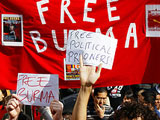Proving the Cynics Right in Burma
By Simon Roughneen for ISN
That's no great achievement, however, given the track record of Burma's rulers. To recap: Since abrogating civilian rule in 1962, the army has maintained a vice-like grip on power. Its external page'Four Cuts'call_made army policy has caused immense suffering in ethnic minority areas, where civilians have been targeted as part of the junta's attempts to defeat ethnic militias, something which many believe to be war crimes and crimes against humanity.
In August 1988, perhaps 10,000 died when a student-led protest was crushed, and many of this external page8888 generationcall_made are leading activists and exile voices today.
In 1990, the regime held an election, confident that its proxy party would win, with the opposition National League for Democracy (NLD) led by Aung San Suu Kyi hampered by a melee of restrictions. But the NLD won a landslide, prompting the junta to annul the result and put the NLD leader in detention. She has been locked up for 14 years since, including a return to house arrest after surviving an apparent assassination attempt in 2003.
In 2007, monk-led protests for greater rights were once more crushed, with 2,000 political prisoners remaining in jail since. In 2008, the Irrawaddy delta region was destroyed by external pageCyclone Nargiscall_made, killing around 150,000 people and leaving three million-plus homeless. The junta refused or delayed international aid. All the while attacks on ethnic minority groups have been ongoing, with the army funded by oil and gas revenues from China, India, Thailand and others.
So some observers credited the junta for pledging to hold an election in 2010, even though it is based on a 2008 constitution (approved in a sham referendum held just days after Cyclone Nargis) that keeps power with the army, including a guaranteed 25 percent seats in the parliament.
The NLD and others have said that the constitution needs to be revised if they are to take part in the elections. However, the US has not backed this explicitly, merely asking that Suu Kyi and political prisoners be freed, and that they participate along with the opposition and ethnic groups in a national reconciliation process prior to elections.
But the election laws published so far have barred Suu Kyi and any other prisoners from political activity, and make loyalty to the constitution a prerequisite for participation in the election. This has all been decided behind closed doors by the junta. Suu Kyi has a criminal conviction because of her 'role' in allegedly hosting a foreign guest in breach of her house arrest, when American John Yettaw swam across a Rangoon lake to her home last May. Most of the other 2,000-plus political prisoners were jailed after the 2007 Saffron Revolution.
The external pageAssociation of Southeast Asian Nationscall_made (ASEAN) will withdraw all assistance to the Nargis-affected region by May or June, and with the junta refusing or cancelling visas for UN workers, this means the foreign presence in the country will be winnowed out by the anticipated October election date, though the timing of the poll is still up in the air. The junta has already snubbed an Indonesian request to send election observers from neighboring Southeast Asia.
Suu Kyi's NLD has 60 days to decide whether or not it will participate in the elections. Otherwise, the new election laws state that any party that fails to comply will be disbanded. The NLD has so far not indicated that it will take part, as the basic conditions for free and fair elections have not been met.
A regime-handpicked electoral commission can decide to close polling stations on the day, or bar parties deemed in breach of the laws from participating. With ethnic conflict a possibility, due to the junta's deadline for militias to merge with the state security forces, this means that elections might not take place in border areas, in turn reducing the potential for a vote against the junta.
Some say the ball is in the international court now. The US has said that the new laws raise doubts about the credibility of the elections - somewhat faint condemnation. More robust words may follow from the EU and UN. However, given that the junta has a strong buffer in China - with India and South Korea competing in the background for commercial influence - it seems unlikely that western words will make any difference.
And while individual ASEAN member-states such as Indonesia might protest at the election laws, and the overall process, ASEAN as a whole is unlikely to do anything to try to change the junta's mind. The ball does not seem to be in anyone's court, really. More likely, the junta has taken the ball and rendered the game a non-starter from the outset.
If the NLD wants to continue as a political party, it will have to expel Suu Kyi, as the new laws prevent parties from retaining convicted criminals.

